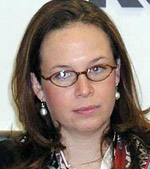“As long as a road map of the Armenian-Turkish conflict is not submitted and the presidents of the two countries haven’t said that progress was registered in the NKR conflict Turkey will not ratify the protocols,” a senior Turkish lawmaker and deputy chairman of the ruling Justice and Development Party (AKP) Suat Kiniklioglu made clear that Ankara continues to make the normalization of Turkish-Armenian relations conditional on a Karabakh settlement. “Ratification is very difficult right now,” Kiniklioglu said, speaking on the sidelines of an international seminar organized in the Armenian capital by the 73rd NATO Parliamentary Assembly. “It’s almost impossible. Especially after the progress of the House Resolution 252, it’s almost impossible.” He said the passage of an Armenian genocide resolution by a U.S. congressional committee has rendered Turkish ratification of the protocols even “more difficult.” “All sides, especially the American side, the Minsk Group, are working on the Karabakh issue,” said the lawmaker. “I hope something positive will come out of it because as soon as something positive comes out, I think we will push the protocols through the parliament,” said Kiniklioglu. Turkey has strongly condemned the draft resolution approved by the Foreign Affairs Committee of the U.S. House of Representatives on March 4. When speaking of the statements of the Armenian side that the protocols should be ratified within reasonable frames Kiniklioglu said, “First they were saying that the Turkish side should ratify it by Christmas; now they are saying till April. Now I am saying that the protocols will not be ratified by April.” Analyst of the International Crisis Group, an Azerbaijani descent Tabib Husseinov stated prior to the Constitutional Court decision of RA dated January 12 the signed protocols were reflecting the interests of the Turks and Azerbaijanis because the Armenian side refused any territorial demands from Turkey. “By recognizing the territorial integrity they’d refuse what they call the recognition of the genocide process,” he said. According to him, after the CC decision the ratification of the protocols doesn’t reflect their interests. However, the head of the European Programs of the International Crisis Group Sabina Fraisser the CC decision didn’t bring any change to the already signed protocols. According to her, in the event of ratification Turkey will benefit from the fact that Armenia will recognize its borders. By this the Diaspora Armenians and the Armenian government will cease demanding the retrieval of their so-called historic lands. According to Fraisser they were thinking the same in Turkey. As of to what Armenia will benefit from is that Armenia will have a chance to have open borders with developing Turkey with 70 million population. “The border will be opened sooner than the work of the commission of historians.” She urged the Armenian side not to mind when Turkey receives a written response from Switzerland on the CC decision and to agree to discuss the Armenian issues in the framework of the commission of historians. And she in the meantime urged the Turkish side not to focus on the overall situation in the south Caucasus but to better focus on the normalization of the Turkish-Armenian relations. On the other hand she urged the Turks to persuade Azerbaijan that the normalization of the Armenian-Turkish relations will promote their interests in the region. RA deputy foreign affairs minister Arman Kirakosyan, who was also present at the seminar emphasized that our historic issues were with the Ottoman Empire and not with the Republic of Turkey. “What happened in the beginning of the 21st century was genocide. Three million people couldn’t possibly oppose the Turkish side but they were abolished and the Armenians were wiped out from the eastern side of Turkey. This is genocide,” said Kirakosyan. But Kiniklioglu opposed him by saying, “if you are so sure that this is genocide why don’t you agree to discuss this within the commission of historians? Come and prove that this is genocide.” As of the NKR conflict then analyst of the International Crisis Group Tabib Husseinov said, “Azerbaijan is becoming more and more impatient. I think that the status quo is used to find a solution for Armenia. This doesn’t require that Azerbaijan should recognize the independence of the NKR and this is acceptable for Azerbaijan.” However, according to Tabib Husseinov in the Armenian and Azerbaijani societies the developments continue being concerning. “I wouldn’t like to blame average people. I think that the Armenian and Azerbaijani elites are using the public concerns to strengthen their positions during negotiations. There is another issue, which doesn’t enable to urge solution to the problem. This is the syndrome of the winner and loser in the Armenian and Azerbaijani societies. Many people think in Armenia that as a winning side they have a bigger risk to lose more within the framework of Madrid principles,” said Tabib Husseinov.

